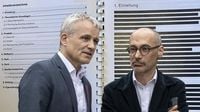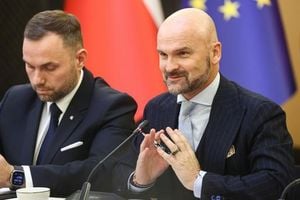A student's work has unexpectedly turned into a national issue, drawing attention that the communications director of the Federal Council likely wished to avoid. The student, hailing from the mathematics and science high school Rämibühl in Zurich, conducted an analysis of the communication strategy employed by Federal Councillor Beat Jans. Her project culminated in a film titled "Beat Jans – Authentic Communicator or Calculating Silent One?" However, the situation took a turn when she found herself at odds with Jans' communications chief, Oliver Washington, whom she had interviewed.
This incident has sparked discussions reminiscent of the "Streisand Effect," a phenomenon where attempts to suppress information only serve to amplify it. In 2003, Barbra Streisand sued a photographer who inadvertently captured an image of her home while documenting coastal erosion, leading to widespread publicity that would have otherwise remained unnoticed. Similarly, Washington's intervention in the student's project has garnered significant media attention, particularly following a report by the Neue Zürcher Zeitung (NZZ) that revealed the extent of censorship involved.
Initially, the student's work was largely ignored, but after Washington exerted pressure on both the student and the school, the film had to be considerably shortened, leaving much of the content obscured. The NZZ reported that only the table of contents and acknowledgments of the 19-page thesis were legible, with the remainder heavily redacted. This censorship has raised questions about the appropriateness of a high-ranking communications director intervening in a high school student's academic work.
Washington, in his public statements, claimed that the student "left the frame of the originally presented concept." He faced accusations of influence from the NZZ and admitted that access to both the written work and the film was "restricted." The school later claimed that the student had blacked out the work herself, yet the student explicitly noted Washington's intervention on the cover sheet of her project.
In a press release issued on April 16, 2025, the school stated, "From the supervisor of the supervisor of the student, she made the agreements regarding quotations, image, and sound recordings." Despite Washington's insistence that he did not demand censorship, he acknowledged that he had asked the school management not to publish the film. The student's frustration was palpable, as she expressed sentiments of "Power Games instead of open dialogue" on the film poster.
As the media storm continued to unfold, the school refrained from supporting the student publicly. It wasn't until the evening of April 16 that they released a statement, which seemed to sidestep the issue of censorship while emphasizing that the student had adhered to agreements concerning her work. In a surprising twist, Washington later announced that he had decided the film could be shown due to the considerable media interest surrounding the case.
However, the school clarified that the Matura work process, including the exhibition, had concluded with the spring break, and neither the film nor the high school thesis would be available for public viewing. According to the school's homepage, the exhibition of the Matura works is set to run until May 9, 2025. On the afternoon of April 16, visitors noted that while other works remained on display, the student's project was conspicuously absent, along with its accompanying poster.
This incident raises important questions about the balance of power between educational institutions and government officials, particularly regarding the freedom of expression and the integrity of student work. The student's experience serves as a cautionary tale about the potential consequences of political interference in academic projects.
In her acknowledgment, the student maintained a positive outlook despite the challenges she faced, stating, "Never feel too comfortable!" This reflects a resilience in the face of adversity, as she navigates the complexities of her educational journey amidst the scrutiny of public opinion and governmental oversight.
The ramifications of this incident extend beyond the individual student, touching on broader themes of censorship, the role of government in education, and the importance of open dialogue in democratic societies. As the story continues to develop, it remains to be seen how this will influence the relationship between students and those in positions of authority.
Ultimately, the case of the Maturaarbeit about Beat Jans has not only spotlighted the challenges faced by students in expressing their views but has also ignited a national conversation about the implications of censorship and the need for transparency in government communications. This situation exemplifies the delicate balance that must be struck to ensure that academic freedom is preserved while also acknowledging the responsibilities of public figures in their interactions with the next generation.






